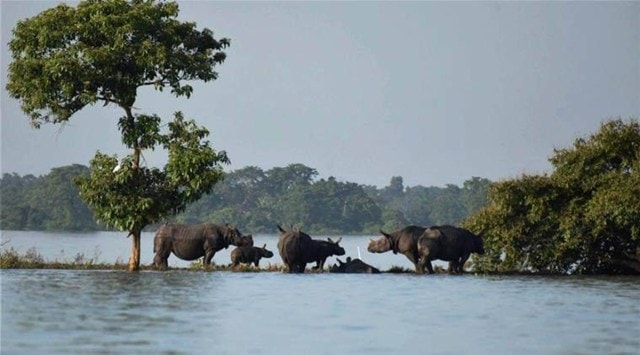In Kaziranga, Indo-French partnership bears fruit
The Kaziranga project is a part of a larger Assam Project on Forest and Biodiversity Conservation (APFBC) for which the Agence Française de Développement (AFD) has committed funding of €80.2 million for a 10-year period, between 2014-2024.
 The Kaziranga project is a part of a larger Assam project. (File/PTI)
The Kaziranga project is a part of a larger Assam project. (File/PTI)Artificial highlands where animals can escape during floods; more than 200 anti-poaching camps; alternate livelihood training for local communities — these measures at the Kaziranga National Park in Assam will form the cornerstone of an Indo-French initiative announced earlier this year.
With French and Indian technical and financial support, the Indo-Pacific Parks Partnership will facilitate partnership activities for interested natural parks of the Indo-Pacific region. These activities include biodiversity conservation, wildlife management and engagement with local communities.
The Kaziranga project is a part of a larger Assam Project on Forest and Biodiversity Conservation (APFBC) for which the Agence Française de Développement (AFD) has committed funding of €80.2 million for a 10-year period, between 2014-2024. The project conceptualised the reforestation of 33,500 hectares of land and the training of 10,000 community members in alternate livelihoods by 2024.
But it is the 457 sq km Kaziranga National Park that remains the heart of the programme.
Chief Conservator of Forests and Kaziranga National Park and Tiger Reserve Director Jatindra Sarma says that the population of animals in the park is the healthiest it has ever been. With the aid of AFD funding, conservation has been ramped up with few poaching cases recorded in the past five years.
“There was just one case of poaching this year, one in 2021 and two cases the year before that. We have successfully stopped poaching in the area,” says Sarma.
Sarma adds that what the AFD programme has been most effective in is the skilling of communities in the area, particularly forest-dwelling communities.
Assam officials say that many of the community members would sometimes be engaged in illegal tree felling by middlemen for illegal timber trade, and would also give shelter to poachers, which no longer happens.
The illegal timber trade is one of the main reasons for the degradation of forests around the reserve. The Assam government has now begun a massive reforestation drive with the help of the AFD.
Divisional Forest Officer, Kaziranga Park, Ramesh Gogoi says that the “protection strategy” adopted by Kaziranga involves setting up 223 anti-poaching camps across the park.
“We ensured that the concentration of camps is higher in areas where there has traditionally been a poaching pressure. The AFD funding has helped us equip the camps as well as build the requisite infrastructure,’’says Gogoi.
There are 35 six-seven foot tall embankments or highlands that have been constructed in various areas around the park, that animals can climb on to and seek refuge during the annual flooding. The project has also developed infrared-based early warning systems, triggered by elephant footfall, to either scare off herds from human habitat or to warn villagers.







